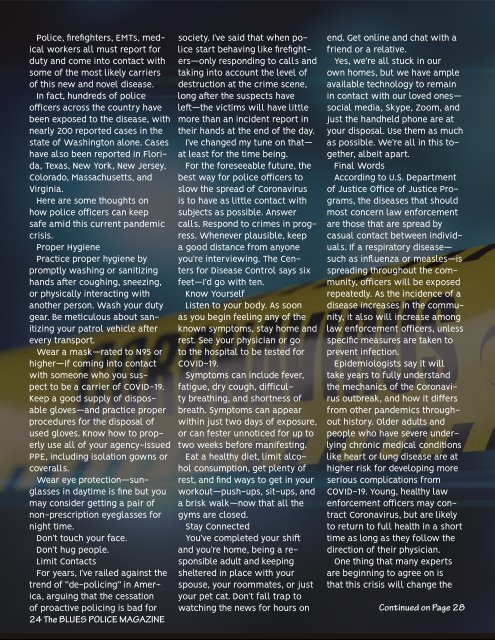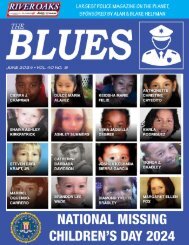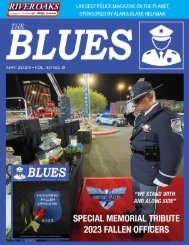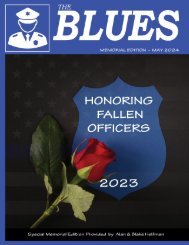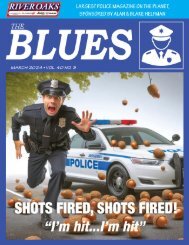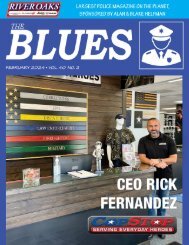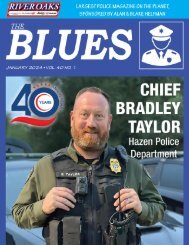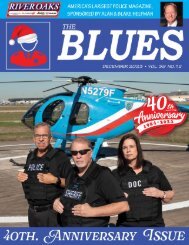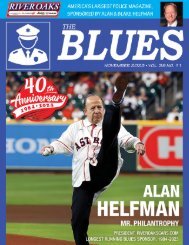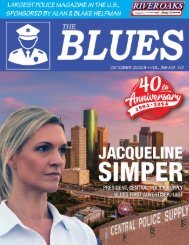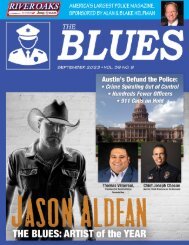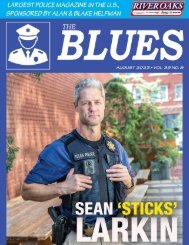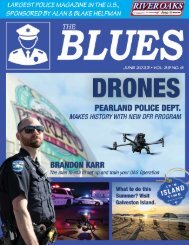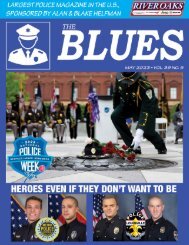April 2020 Blues Vol 36 No 4
April 2020 Blues Vol 36 No 4 Surviving COVID - 19
April 2020 Blues Vol 36 No 4
Surviving COVID - 19
- TAGS
- disenfectant
- face-mask
- protect-police-against-virus
- harris-county-sheriff
- police-news-houston
- police-news-texas
- houston-police
- blues-police-newspaper
- blues-police-magazine
- the-blues
- cops-mag
- cops
- war-stories
- police-war-stories
- surviving-covid
- police-publication
- police-magazine
- coronavirus
- police
- covid
You also want an ePaper? Increase the reach of your titles
YUMPU automatically turns print PDFs into web optimized ePapers that Google loves.
What Law Enforcement Personnel need to know about<br />
Coronavirus Disease (COVID-19) from the CDC<br />
Police, firefighters, EMTs, medical<br />
workers all must report for<br />
duty and come into contact with<br />
some of the most likely carriers<br />
of this new and novel disease.<br />
In fact, hundreds of police<br />
officers across the country have<br />
been exposed to the disease, with<br />
nearly 200 reported cases in the<br />
state of Washington alone. Cases<br />
have also been reported in Florida,<br />
Texas, New York, New Jersey,<br />
Colorado, Massachusetts, and<br />
Virginia.<br />
Here are some thoughts on<br />
how police officers can keep<br />
safe amid this current pandemic<br />
crisis.<br />
Proper Hygiene<br />
Practice proper hygiene by<br />
promptly washing or sanitizing<br />
hands after coughing, sneezing,<br />
or physically interacting with<br />
another person. Wash your duty<br />
gear. Be meticulous about sanitizing<br />
your patrol vehicle after<br />
every transport.<br />
Wear a mask—rated to N95 or<br />
higher—if coming into contact<br />
with someone who you suspect<br />
to be a carrier of COVID-19.<br />
Keep a good supply of disposable<br />
gloves—and practice proper<br />
procedures for the disposal of<br />
used gloves. Know how to properly<br />
use all of your agency-issued<br />
PPE, including isolation gowns or<br />
coveralls.<br />
Wear eye protection—sunglasses<br />
in daytime is fine but you<br />
may consider getting a pair of<br />
non-prescription eyeglasses for<br />
night time.<br />
Don’t touch your face.<br />
Don’t hug people.<br />
Limit Contacts<br />
For years, I’ve railed against the<br />
trend of “de-policing” in America,<br />
arguing that the cessation<br />
of proactive policing is bad for<br />
society. I’ve said that when police<br />
start behaving like firefighters—only<br />
responding to calls and<br />
taking into account the level of<br />
destruction at the crime scene,<br />
long after the suspects have<br />
left—the victims will have little<br />
more than an incident report in<br />
their hands at the end of the day.<br />
I’ve changed my tune on that—<br />
at least for the time being.<br />
For the foreseeable future, the<br />
best way for police officers to<br />
slow the spread of Coronavirus<br />
is to have as little contact with<br />
subjects as possible. Answer<br />
calls. Respond to crimes in progress.<br />
Whenever plausible, keep<br />
a good distance from anyone<br />
you’re interviewing. The Centers<br />
for Disease Control says six<br />
feet—I’d go with ten.<br />
Know Yourself<br />
Listen to your body. As soon<br />
as you begin feeling any of the<br />
known symptoms, stay home and<br />
rest. See your physician or go<br />
to the hospital to be tested for<br />
COVID-19.<br />
Symptoms can include fever,<br />
fatigue, dry cough, difficulty<br />
breathing, and shortness of<br />
breath. Symptoms can appear<br />
within just two days of exposure,<br />
or can fester unnoticed for up to<br />
two weeks before manifesting.<br />
Eat a healthy diet, limit alcohol<br />
consumption, get plenty of<br />
rest, and find ways to get in your<br />
workout—push-ups, sit-ups, and<br />
a brisk walk—now that all the<br />
gyms are closed.<br />
Stay Connected<br />
You’ve completed your shift<br />
and you’re home, being a responsible<br />
adult and keeping<br />
sheltered in place with your<br />
spouse, your roommates, or just<br />
your pet cat. Don’t fall trap to<br />
watching the news for hours on<br />
end. Get online and chat with a<br />
friend or a relative.<br />
Yes, we’re all stuck in our<br />
own homes, but we have ample<br />
available technology to remain<br />
in contact with our loved ones—<br />
social media, Skype, Zoom, and<br />
just the handheld phone are at<br />
your disposal. Use them as much<br />
as possible. We’re all in this together,<br />
albeit apart.<br />
Final Words<br />
According to U.S. Department<br />
of Justice Office of Justice Programs,<br />
the diseases that should<br />
most concern law enforcement<br />
are those that are spread by<br />
casual contact between individuals.<br />
If a respiratory disease—<br />
such as influenza or measles—is<br />
spreading throughout the community,<br />
officers will be exposed<br />
repeatedly. As the incidence of a<br />
disease increases in the community,<br />
it also will increase among<br />
law enforcement officers, unless<br />
specific measures are taken to<br />
prevent infection.<br />
Epidemiologists say it will<br />
take years to fully understand<br />
the mechanics of the Coronavirus<br />
outbreak, and how it differs<br />
from other pandemics throughout<br />
history. Older adults and<br />
people who have severe underlying<br />
chronic medical conditions<br />
like heart or lung disease are at<br />
higher risk for developing more<br />
serious complications from<br />
COVID-19. Young, healthy law<br />
enforcement officers may contract<br />
Coronavirus, but are likely<br />
to return to full health in a short<br />
time as long as they follow the<br />
direction of their physician.<br />
One thing that many experts<br />
are beginning to agree on is<br />
that this crisis will change the<br />
Continued on Page 28<br />
24 The BLUES POLICE MAGAZINE<br />
The The BLUES POLICE MAGAZINE 25 25


